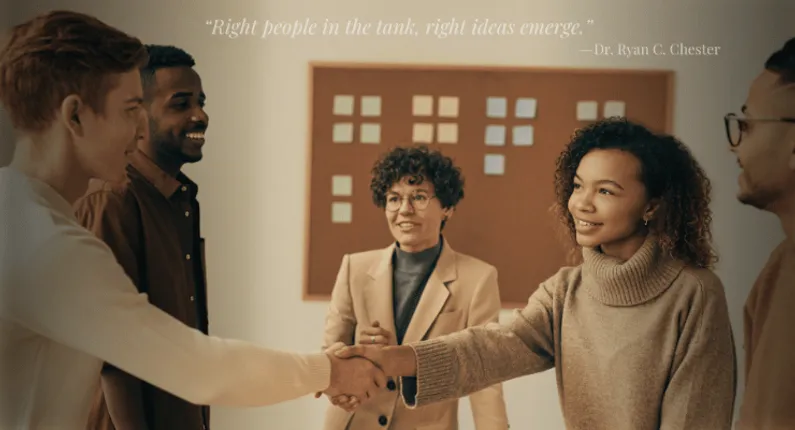
The Effective Think Tank – Part 2: Vetting Participants
After deciding that a think tank is needed to resolve a problem or to find a solution for an unmet need, the next step is to choose a team that will participate in the think tank. At this stage it is important to understand that the team does not build the think tank. Their function is to put appropriate fish in the tank and then to select which fish are the most suited for pulling out of the tank to prepare for the feast.
The analogy that is perhaps most appropriate for this function is in the domain of fish specialists of various types. These kinds of people are called ichthycologists (scientists specializing in the study of fish), pisciculturist (scientists specializing in breeding fish), and poissoners (chefs that specialize in preparing and cooking fish). The ichthycologist understands the appropriate kinds of fish that are suited for various kinds of environments. The pisciculturist is an expert at breeding and nurturing fish in preparation for various kinds of environments. The poisoner is practiced at the culinary nuances of fish preparation, from the cleaning process to the seasoning, cooking, serving, and overall consumer experience. Combined these skills illustrate the kinds of people needed to participate in a think tank; for they are tasked with understanding the nuances of the problem to be solved for the particular organization or objective at hand, the breeding and nurturing of ideas that might resolve the problem, and anticipating how the solution needs to be organizationally prepared, presented, and experienced by the team and the end user or consumer. In short, the team needs to anticipate the full spectrum of engagement to resolve the problem or unmet need—from beginning to popular acceptance.
A relevant guideline for screening and vetting your think tank contributors is identified by the acronym ACCORD. The acronym identifies six prominent traits that each participant can be evaluated against. As the word ACCORD suggests, accord denotes agreement or harmony in both nominal and verbal forms. In the noun form an accord signifies a concrete reality even if the reality is an abstract understanding: they stand in one accord (as one) with one another. The verb denotes the transitive or intransitive act, regardless of tense, that confers the action of agreement*: they all are accorded opportunity for strength and honor*, or they agree to accord by the principles of decorum and conduct. The idea of accord suggests total agreement, harmony, oneness of purpose and intent, and the individual’s sovereignty of will in the decision or engagement. Each word in the ACCORD schema is spelled out as follows:
- Authority: Each participant should be a recognized leader and influencer in their respective skill and industry. The level of authority could be local in size or international. The kind of authority can be expert, positional, relational, or all the above. The kind of authority desired in a think tank depends on the overall problem to be solved.
- Competency: The idea of competency can only be established by experience, ability/aptitude, time, and confirmation from others. Depending on the think tank’s goals the area of competency can be organizational, developmental, in leadership, or in other aspects of departmental management or skill sets relevant to the overall objectives.
- Collaboration: While the first two emphasize recognized skill sets, the next three emphasize an attitude or quality. Collaboration entails a team-centric approach. This skill is vital for any think tank. All participants must be able to brainstorm and develop solutions with each other. There is no place for individualism in a think tank.
- Optimism: The quality of optimism represents the attitude of forward-looking hope. People who demonstrate strong qualities of optimism (mixed with a healthy dose of prudent realism) can project excitement and anticipate victory. The optimist views the world through the appraising lens of positive, hopeful, imaginative, energetic, and realistic attainability. A health think tank must have this element in all team members to overcome the problem or unmet need.
- Resilience: Another quality that is necessary is the ability to endure criticism. In a think tank ideas are presented and dismissed, shot down, or rejected by others for various reasons. Thus, each team member must be cognitively and emotionally resilient. The larger goal of resolving the problem presented in the think tank is why everyone is gathered. A good moderating leader will help overcome most potential issues. However, each member of the team must be personally strong in their character and not easily offended.
- Diversity: The final trait in the ACCORD schema does not focus on either a recognized skill set or an attitude/quality that each participant must possess. Instead, the final trait focuses on the overall mix of participants. The combination of participants must be diverse in skills, industries, experiences, etc. Diversity emphasizes variety of abilities and a difference in the way problems are solved, with different problem-solving tools, and different ways of seeing solutions. For example, if the think tank is designed to solve a problem in the insurance industry, then to fulfill the diversity requirement the think tank should attract people in other industries as well. The reason for diversity is to be able to evaluate the problem with fresh eyes and different ways of framing questions. While it is important to have one or two people in the think tank from the target industry it is vital to get multiple different industries, and skill sets to round of the team.
An effective think tank requires a vetted group of participants. The ACCORD scheme serves as a helpful guide for building your team. Once the team is formed the think tank can be scheduled and the plan discussed in part 1 can be put into motion. Part 3 will discuss the art of leading an effective think tank.
To read the first article, see:





